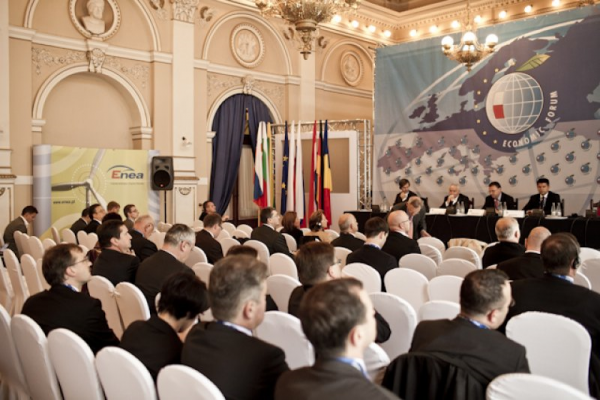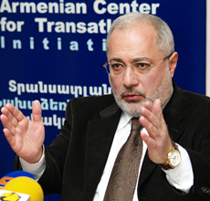Speech by Vahan Hovhanessyan, leader of the ARF-D parliamentary faction and member of the ARF-D Bureau, at a panel discussion during the 20th Economic Forum for Central and Eastern Europe (CEE) in Krynica, Poland, September 9, 2010
Ladies and Gentlemen,
In one week, the last preparatory meeting of the Enlarged Bureau of the Euronest Parliamentary Assembly (PA) is going to commence in Brussels. Let me introduce myself. I am Vahan Hovhannesyan, head of the Armenian parliamentary delegation to the Euronest PA.
As you undoubtedly know, Euronest is considered to be the parliamentary dimension to the Eastern Partnership. And I would like to express my gratitude to our Polish hosts not only for their hospitality, but also for their relentless efforts to develop and promote the new European Eastern Policy, a part of which the Euronest PA has had the destiny to become. The first meeting of Eurnoest was postponed many times because of some controversies concerning the question of Belorussian participation, as well as some points in the Rules of Procedure. Now we move toward that meeting somewhat weary of discussions, embarrassed about the distorted balance within that newly emerging organization and uncertain about the capabilities of it within the framework of the four thematic platforms of the Eastern Partnership program.
The questions raised become very important right now, because the talks on the Association Agreements between the European Union and Southern Caucasus countries started this summer. Was it not possible find a form of participation for the parliamentarians from the Eastern Partner countries in the activities of the European Parliament initially as observers, then with some other status, instead of creating a new and let me remind you rather expensive Parliamentary Assembly, especially when it is seen not only as a bridge between the European parliament and Eastern Parliaments, but as a wall between them by some political analysts, preventing direct cooperation and integration?But what is done, is done. So now we approach the final stage and the Euronest Parliamentary Assembly is going to be established soon, and I can assure you that the Armenian component of it will do its best to achieve the goals declared in the Draft Constituent Act and aimed to create the parliamentary support to the four Eastern Partnership platforms:
- democracy, good governance and stability
- economic integration
- energy security
- contacts between people
But first of all we need to avoid many hidden traps on our path.
1. Euronest must at any cost avoid the danger of becoming yet another zone of clashes and threats and scandalous statements, where Eastern Partners cry, blame and insult each other while trying to impress the EU Partners and to justify their shortcomings (for example in the field of democracy) by the hostile plotting and even existence of bad neighborly relations. I think our Western colleagues are tired of that pathetic practice.
2. At this beginning stage, when the parliamentary delegations haven’t had enough time yet to converge and establish a model of working together, it is too early to make vital decisions by a simple majority vote. In some cases a consensus will be required.
3. And lastly, the main concern: being a very promising, but still new and inexperienced organization, which includes parties with antagonistic positions on different matters, Euronest must be cautious enough not to dwell on the evaluation and resolution of existing conflicts, lacking the means, instruments, expertise and experience in matters where other internationally established institutions are fully engaged. Instead, Euronest has to create an atmosphere of mutual understanding, trust and tolerance and eliminate suspicion and hatred.
All the amendments made by the Armenian delegation to the Euronest PA’s Rules of Procedure are based on these principles and I’m sure they will be adopted by our Partners from the West and from the East.
Thank you for your attention.
Background:
The Economic Forum is one of the most significant international events in the region, billing itself as the ‘Central European Davos’, in reference to the annual World Economic Forum in the Swiss town. Among this year’s attendees are the presidents of Poland, Ukraine, Estonia and several EU figures, including European Commission President José Manuel Barroso and European Parliament President Jerzy Buzek.
Three topics dominate the agenda this year: the EU’s Eastern neighbours, energy and the economic crisis. Several seminars took place on the sidelines of the forum including, The Eastern Partnership: an Effective Mechanism for a Conditional Support Model.









